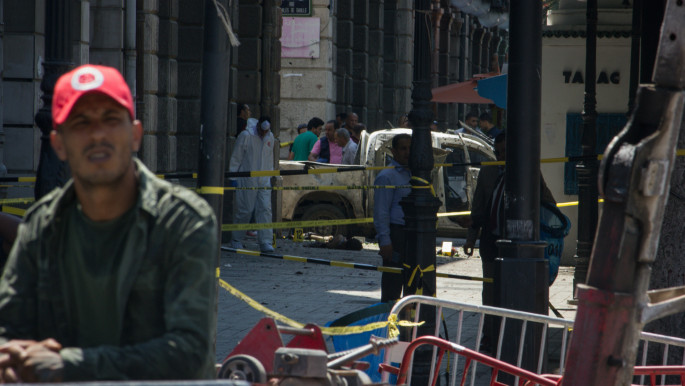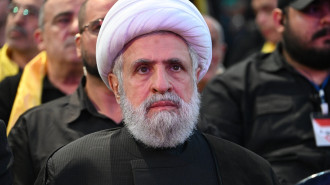Tunisian voters defiant despite terror attacks and president's ill health
A week after the twin explosions in the Tunisian capital and President Essebsi's serious health crisis, there appears to be enough will among political forces to avoid a vacuum scenario and hold this year's elections without delay.
Last week, Tunisia was shaken by two events that occurred on the same day. A pair of suicide bombings struck almost simultaneously in Tunis killing one police officer and wounding several other people amid news that 92-year-old President Beji Caid Essebsi was rushed to hospital after suffering a "severe health crisis".
Prime Minister Youssef Chahed condemned the attacks as a "cowardly operation" that is aimed to "destabilise Tunisians, the economy and democratic transition" ahead of a double vote in autumn.
Read more here: Deadly bomb blasts target security forces in Tunisian capital
"Terrorist attacks should not serve as an excuse to put off elections, suppress freedoms and undermine aspirations," Tunisian labour union UGTT said urging cohesion and increased vigilance in a press release issued after the twin blasts.
"It's fundamental that the procedures are followed and the elections go ahead as planned," pointed out Anis Jarboui, member of the Independent High Electoral Commission (ISIE).
"We will not accept any moves or manoeuvres aimed at affecting the electoral process. Any delay in the elections would be unconstitutional."
The incidents came months before parliamentary and presidential elections which are scheduled to take place on October 6 and November 17 respectively.
The following day, Tunisian officials timely reassured citizens that there would be no power vacuum in the North African state as local media reports had started to circulate about the president's confusing and uncertain health state raising concerns about a vacant position.
Read also: No 'power vacuum' in Tunisia despite president's death rumours
Essebsi's hospitalisation opened much discussion around what would happen in the event of a succession.
Based on Tunisia's constitution, for a temporary vacancy the prime minister, Chahed, can serve as interim president for a period of no more than 60 days. In case of death or other permanent incapacity, the speaker of parliament, Mohamed Ennaceur, is tasked with the role for up to 90 days.
The problematic question is that Tunisia lacks a constitutional court, the independent judicial body that has the power to declare the presidency vacant and appoint people to the role of acting president.
 |
Eight years after the Arab Spring, the political elite has not yet reached an agreement to set up a constitutional court, which is widely seen as a critical shortfall that could lead to instability |  |
Eight years after the Arab Spring, the political elite has not yet reached an agreement to set up a constitutional court, which is widely seen as a critical shortfall that could lead to instability.
Last March, for the fifth consecutive time, the Tunisian parliament failed to elect the court's members due to lack of consensus between the parliamentary blocs on the proposed candidates.
Following adoption of the Tunisian constitution three years after the 2011 revolution that overthrew long-time dictator Ben Ali, with the exception of one judge voted, every attempt to choose the three others within parliament has collapsed thus repeatedly deferring the creation of a court.
The President of the Republic, the House of People's Representatives (HPR) and the Supreme Council of the Judiciary each appoint four judges by a reinforced majority of 145 votes. The first four members of the 12-member court must be elected by the HPR before the other two select the remaining eight members.
"What happened [to Essebsi] has unveiled one big deficiency in the Tunisian democratic process. It has served to underscore the need to establish a functioning constitutional court," noted Selim Kharrat, head of Tunisian NGO Al-Bawsala that promotes democracy and human rights and monitors the parliament's activities. He hinted at calls by the political class and civil society for accelerating the establishment of a court in light of last week's events.
In the aftermath of president Essebsi's health scare, presidents of parliamentary groups met on Thursday to discuss election of the court's missing members. The HPR's bureau decided to reconvene next week to complete election of the three members.
A constitutional court is crucially necessary to decide on the constitutionality of laws passed and actions that may be taken by whoever wins the 2019 parliamentary and presidential elections.
It is also important in resolving power disputes between the two executives led by President Essebsi and Prime Minister Chahed respectively.
 |
|
| Read also: Terrorism strikes Tunisia again at a time of tourism recovery |
In the absence of a true court, Tunisia created a temporary body which can only rule on the constitutionality of draft laws.
The president of Al-Bawsala thinks that since Essebsi's health incident there is "real awareness" of the necessity of a constitutional court "that can generate sufficient political will" to speed up the appointment of the 12 judges and form the court.
For Jarboui, the court formation is a matter that requires "political will" and "consensus" among the different political parties represented in parliament. Provided these two key ingredients are there, he maintained, Tunisia can finalise the making of the instance within few weeks.
While acknowledging some complication in the process, Sharan Grewal, research fellow at the Brookings Institution focussing on North Africa, made optimistic remarks vis-à-vis the constitutional dilemma pointing to two pressing points. The deterioration in the president's health has increased the impetus to form a court before the elections.
The other pressure, he continued, comes from the performance in the opinion polls of new surging candidates, who are challenging the Muslim Ennahda movement and its secularist allies in the next elections.
"That may push establishment parties to lock-in their own representation in the court before the voting in autumn while they still hold their seats in parliament," the Brookings' fellow argued, adding: "The well-performing rival outsiders may otherwise gain better representation if a court is formed post-elections."
Alternatively, the parliament could grant the provisional instance the power to not just rule on draft laws but also declare the presidency vacant.
On Monday, the Ennahda movement called for an amendment that would allow the temporary authority to assume the functions of the constitutional court in respect of the procedures to fill a vacancy in the office of the president.
With or without a court in place, Grewal is confident that the various political forces want to avert a political crisis by reaching consensus.
Although the latest terror actions may encourage those actors seeking to postpone the upcoming elections, it does not seem that terrorism would be a plausible motive for delaying the polls.
Small-sized and causing low casualties, last week's explosions targeted police. There have been no attacks on tourists for years as security has improved following the two deadly attacks at Tunis' Bardo Museum and in a Sousse beach resort in 2015.
Both Grewal and Kharrat rejected claims that the Tunis bombings could have any impact on the course of the elections.
 |
Deferring the elections would send a very bad signal to our citizens at a time when we have made steady progress toward democracy. We have to stick to the election schedule |  |
In the meantime, Tunisia's pre-electoral phase has been marred by controversy due to electoral law amendments, approved by parliament on June 18, banning candidates who resort to charitable associations or foreign funding during the year before an election.
The new amendments are perceived by critics as aimed at blocking the way for unexpected frontrunners in opinion polls, namely businessman and media mogul Nabil Karoui, critical of the government, and social personality Olfa Terras.
As Tunisians have become increasingly frustrated with the country's struggling economy, the main political parties are seeing a rapid drop in their popularity and outsiders are getting ready for this year's elections.
While the latest shock events have cast a shadow over the country's democratic transition – which remains a fragile course – there is little incentive for any major political players to create a crisis before the polls. In fact, holding elections on time would pre-empt further uncertainty.
"Deferring the elections would send a very bad signal to our citizens at a time when we have made steady progress toward democracy. We have to stick to the election schedule," ISIE's member Jarboui emphasised.
 |
Often praised as the only democratic success of the Arab Spring, Tunisia has faced extended economic problems amid rising joblessness and inflation |  |
The Tunisian president signed the presidential decree on Thursday inviting voters to the parliamentary and presidential elections.
Despite his party's calls for him to stand again, Essebsi announced he would not stand for re-election in the November polls. A candidate to replace him has not yet been named.
Often praised as the only democratic success of the Arab Spring, Tunisia has faced extended economic problems amid rising joblessness and inflation.
"True, Tunisia is passing through a fragile democratic path. But it has also proven to have strong institutions and a political class that is able to discuss and find solutions in the face of a danger," Kharrat concluded.
"It's the asset of our transition, what differentiates the Tunisian experience from those of our Arab neighbours."
Follow her on Twitter: @AlessandraBajec





 Follow the Middle East's top stories in English at The New Arab on Google News
Follow the Middle East's top stories in English at The New Arab on Google News


